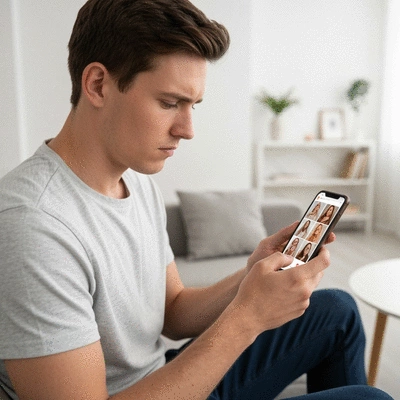In a world where social media and societal standards dictate our perceptions of beauty, understanding the journey to self-acceptance is crucial. Have you ever wondered how deeply these external influences shape your self-image? Let's explore the key insights that can empower you on your path to embracing your unique self.
What You Will Learn
- Recognizing societal standards and their impact on body image is essential for developing self-acceptance.
- Understanding psychological factors, including comparison and negative self-talk, can help challenge damaging perceptions.
- Low self-esteem significantly affects mental health, contributing to increased anxiety, depression, and relationship difficulties.
- Identifying signs of low self-esteem, such as self-criticism and social avoidance, is crucial for fostering self-awareness.
- Social media intensifies comparison culture, creating unrealistic beauty standards that can lead to feelings of inadequacy.
- Embracing unique strengths and practicing daily affirmations can foster a positive self-image and boost self-esteem.
- Creating a sustainable self-care routine is vital for nurturing self-acceptance and overall well-being.
- Seeking help and building a supportive community can enhance your journey toward self-acceptance and personal growth.
Factors Contributing to Low Self-Esteem & Negative Body Image
This visual highlights the key societal and psychological factors that contribute to feelings of being "ugly" and impact mental well-being.
Understanding Feelings of Being "Ugly"
Societal Standards & Body Image
- Media portrayal of beauty ideals
- Influence of advertising on self-image
- Cultural perceptions of attractiveness
Psychological Factors Affecting Self-Perception
- Comparison with others
- Negative self-talk and internalized beliefs
- Past experiences and traumas
Impacts on Mental Health & Social Media Influence
Low Self-Esteem & Well-Being
- Increased anxiety and depression
- Difficulty in relationships
- Struggles with motivation and goals
Social Media & Self-Image
- Curated content leading to unrealistic standards
- Pressure to conform to trends
- Fear of missing out (FOMO)
Understanding Feelings of Low Self-Esteem and Body Image
Many people grapple with feelings of low self-esteem and negative body image, often leading to the belief that they are "ugly." It's crucial to understand the underlying factors contributing to these feelings, as they can significantly impact our lives. At The Stone Builders Rejected, we aim to shed light on these intricate issues, empowering readers with knowledge and insights.
Feeling unattractive can stem from various sources, which I'll explore further. Let's dive into the factors that shape how we perceive ourselves and others.
What Contributes to Feelings of Being "Ugly"?
Understanding why we might consider ourselves "ugly" involves examining societal influences and psychological factors. Recognizing these components can help us challenge these damaging perceptions.
The Role of Societal Standards in Body Image
- Media portrayal of beauty ideals
- Influence of advertising on self-image
- Cultural perceptions of attractiveness
Societal standards heavily influence our perceptions of beauty. From magazine covers to social media feeds, we’re constantly bombarded with images that set unrealistic expectations. These portrayals can distort our self-image, making it challenging to appreciate our uniqueness. Research from PMC NCBI highlights the impact of these media portrayals on body image.

Psychological Factors Affecting Self-Perception
- Comparison with others
- Negative self-talk and internalized beliefs
- Past experiences and traumas
On a psychological level, comparison with others plays a significant role in how we view ourselves. Many of us engage in negative self-talk, reinforcing feelings of inadequacy. Past experiences, whether they be bullying or societal rejection, can deeply affect our self-perception. Acknowledging these factors is the first step toward healing.
How Low Self-Esteem Impacts Mental Health
Low self-esteem is more than just a fleeting feeling; it can have profound effects on our mental health. Understanding this connection is vital for fostering a healthier self-image.
Connecting Self-Image to Overall Well-Being
- Increased anxiety and depression
- Difficulty in relationships
- Struggles with motivation and goals
When we struggle with our self-image, it can lead to feelings of anxiety and depression. These emotions can seep into various aspects of our lives, affecting our relationships and inhibiting our motivation. Recognizing the link between self-esteem and mental health can help us prioritize self-care. Further insights into the relationship between self-esteem and mental health are available from PMC NCBI.
Recognizing Signs of Low Self-Esteem
- Frequent self-criticism
- Avoiding social situations
- Difficulty accepting compliments
It's important to identify the signs of low self-esteem. Common indicators include a tendency toward self-criticism, avoiding social interactions, and struggling to accept praise. Understanding these signs can lead to better self-awareness and the steps needed for improvement.
Exploring the Influence of Social Media on Self-Image
Social media platforms can significantly impact our self-image, often intensifying feelings of inadequacy. I want to share insights on how this phenomenon affects us.
Understanding Comparison Culture and Its Effects
- Curated content leading to unrealistic standards
- Pressure to conform to trends
- Fear of missing out (FOMO)
In the age of social media, we are constantly faced with curated content that often sets unrealistic beauty standards. This comparison culture can lead to immense pressure to conform and fit in, heightening feelings of inadequacy. It's essential to understand this influence and actively work against it. A study published in Wiley Online Library explores the impact of social comparison on consumer behavior and self-perception.
The Role of Beauty Influencers in Shaping Perceptions
- Impact of influencer marketing on ideals
- Authenticity vs. staged images
- Effects of following trends blindly
Beauty influencers are powerful figures in shaping societal perceptions of beauty. However, the authenticity of their content can often be questionable, leading followers to compare themselves unfavorably against staged images. It's vital to remember that these representations are often not reflective of reality, helping us ground our self-perception.

Interactive Poll: Your Thoughts Matter!
As we discuss the complexities of self-image and self-esteem, we want to hear from you! Which aspect of body image impacts you the most?
Frequently Asked Questions About Self-Acceptance and Body Image
Q: How do societal beauty standards contribute to negative self-image?
A: Societal beauty standards, often perpetuated by media and advertising, create unrealistic expectations. Constant exposure to these ideals can lead individuals to compare themselves unfavorably, distorting their self-image and fostering feelings of inadequacy.
Q: What psychological factors are most influential in developing low self-esteem?
A: Key psychological factors include comparison with others, negative self-talk, and internalized beliefs. Past experiences and traumas can also profoundly affect self-perception, reinforcing feelings of being "ugly" or unworthy.
Q: How does low self-esteem impact mental well-being?
A: Low self-esteem can significantly increase the risk of anxiety and depression. It can also lead to difficulties in relationships, hinder motivation, and impede the ability to achieve personal goals, negatively affecting overall mental health.
Q: What are common signs of low self-esteem to look out for?
A: Common signs of low self-esteem include frequent self-criticism, avoidance of social situations, and difficulty accepting compliments. Recognizing these indicators is crucial for self-awareness and taking steps toward improvement.
Q: In what ways does social media influence body image and self-perception?
A: Social media intensifies comparison culture through its curated content, presenting unrealistic beauty standards. This can create pressure to conform to trends, heighten feelings of inadequacy, and lead to "Fear of Missing Out" (FOMO), negatively impacting self-image.
Q: What are practical steps to foster a positive self-image and boost self-esteem?
A: Practical steps include identifying and celebrating personal strengths, practicing daily affirmations, and engaging in activities that bring joy and fulfillment. Creating a sustainable self-care routine with mindful practices can also significantly boost self-esteem.
Embracing Your Unique Self: Summary of Key Takeaways
As we wrap up our exploration of self-esteem and body image, it's important to reflect on the journey ahead. Embracing our unique selves is not just a destination; it’s a continuous process of growth and self-acceptance. Taking the first step can often feel daunting, but I assure you, it can lead to profound changes in how we view ourselves and the world around us.
To begin this journey, consider these essential steps that can guide you toward self-love:
- Identify personal strengths and celebrate small victories.
- Practice daily affirmations to cultivate a positive mindset.
- Engage in activities that bring you joy and fulfillment.
These steps are not just about improving your self-image; they are about fostering a deeper connection with who you truly are. By acknowledging and embracing your individuality, you can start to dismantle the barriers that low self-esteem creates.
Reflecting on Personal Growth and Self-Acceptance
Starting your journey of self-love might seem overwhelming, but every small action counts. Here are some practical steps to help you kickstart your path toward self-acceptance:
- Commit to a daily practice of positive affirmations.
- Set realistic goals for personal growth.
- Explore hobbies that resonate with your passions.
Creating a sustainable self-care routine is also crucial. Incorporating mindful practices into your everyday life can significantly boost your self-esteem. Remember, it’s about making small, manageable changes that can lead to lasting impact!
Creating a Sustainable Self-Care Routine
Establishing a self-care routine doesn’t have to be complicated! Here are some simple components to consider:
- Set aside time each day for yourself, even if it’s just 10 minutes.
- Engage in physical activities that you enjoy, such as walking or yoga.
- Try meditation or deep-breathing exercises to calm your mind.
By nurturing yourself regularly, you create a solid foundation for self-acceptance and well-being. It’s in these moments of self-care that we start to understand our worth and value.
Encouragement to Seek Help and Share Your Journey
As you navigate this journey toward self-acceptance, remember that seeking help is a sign of strength, not weakness. It’s okay to lean on others for support. Building a strong support network can enhance your growth and provide you with the encouragement you need. Here are some ways to find help:
- Consider talking to a mental health professional.
- Engage with supportive friends or family members.
- Look for community groups focused on self-improvement.
Connecting with others who share similar experiences can be incredibly empowering. It’s a reminder that you’re not alone in your struggles!
Inviting Readers to Share Their Experiences and Insights
I invite you to share your journey and insights with us! Your stories can inspire others who might be facing similar challenges. Together, we can foster a community that values openness and support. What steps have you taken towards self-acceptance? Your voice matters!
Empowerment Through Community Support and Resources
Remember, empowerment is about lifting each other up. By sharing resources and encouraging open dialogue, we can help each other grow. At The Stone Builders Rejected, we’re dedicated to fostering discussions around these important topics. Join us in creating a supportive community where everyone feels heard and valued!
Recap of Key Points
Here is a quick recap of the important points discussed in the article:
- Societal standards, influenced by media and culture, shape our perceptions of beauty and can lead to negative self-image.
- Psychological factors such as comparison, negative self-talk, and past experiences significantly affect self-perception.
- Low self-esteem can result in increased anxiety, relationship difficulties, and struggles with motivation.
- Recognizing signs of low self-esteem, like frequent self-criticism and social avoidance, is crucial for self-awareness.
- Social media exacerbates feelings of inadequacy through curated content and comparison culture.
- Embracing unique selves and practicing self-care are essential steps towards building self-acceptance and well-being.
- Seeking support from friends, family, or mental health professionals can greatly enhance personal growth.






